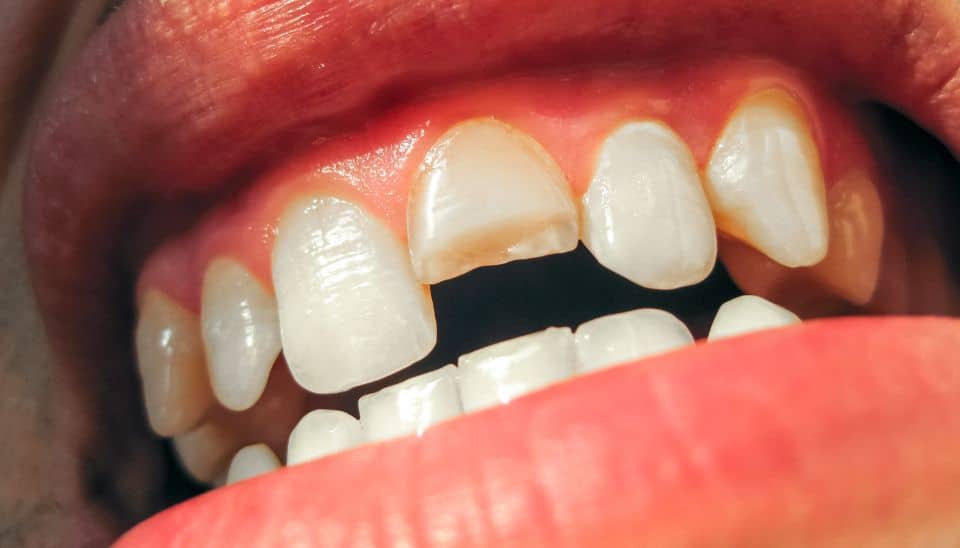Breaking or chipping a tooth can be a distressing experience, but acting quickly can make a big difference. At Hamilton Dental Centre, Dr. Dave Blom and Dr. Bashar Humadi have years of experience treating dental emergencies.
In this guide, we’ll explain the steps to take if you chip or break a tooth, how to reduce swelling, and the treatments available to restore your smile.
Recognising a Chipped or Broken Tooth
A chipped or broken tooth can vary in severity. Some cases are obvious, like a visible crack, while others might not be immediately noticeable. Here are some common signs:
- Visible Damage: A chip, crack, or missing piece of tooth enamel.
- Sensitivity: Pain or discomfort when eating or drinking something hot, cold, or sweet.
- Sharp Edges: Jagged parts of the tooth that can irritate your tongue or cheek.
- Swelling or Bleeding: Tender or swollen gums around the damaged tooth.
If you experience any of these symptoms, it’s important to visit your dentist as soon as possible.
Steps to Take Immediately After Breaking a Tooth

Knowing what to do in the moment can save your tooth and reduce discomfort.
Rinse Your Mouth
Gently rinse with warm salt water. This helps clean the area and reduce swelling.
Save the Broken Pieces
If you can, collect any broken fragments of the tooth. Store them in milk or a saline solution and bring them to your dentist.
Protect Your Mouth
If the tooth has a sharp edge, cover it with dental wax or sugar-free gum to avoid injuring your tongue or cheek.
Manage Pain and Swelling
Use a cold compress on the outside of your cheek to reduce swelling. Over-the-counter pain relievers can also help, but avoid aspirin, as it may increase bleeding.
Seek Emergency Dental Care
Contact your dentist immediately. Quick action can prevent further damage and increase the chances of saving your tooth.
Types of Tooth Damage and Their Treatments
Not all tooth injuries are the same. Here’s an overview of common types of damage and how they’re treated:
Chipped Tooth
A small chip in your tooth enamel is usually not painful, but it can make your smile uneven. Dentists often repair chipped teeth with tooth-coloured fillings or dental bonding.
Cracked Tooth
Cracks can range from minor to severe. If the crack extends into the pulp (the inner part of the tooth containing nerves and blood vessels), root canal treatment may be needed to save the tooth.
Split Tooth
A split tooth is a more serious type of crack where the tooth has separated into distinct segments. In many cases, a root canal or tooth extraction might be necessary.
Broken Tooth
If a large portion of the tooth is broken off, it can expose the pulp, causing significant pain. Treatments include dental crowns, root canals, or, in severe cases, tooth extraction.
When to Visit Your Dentist
Even minor chips or cracks should be checked by a dentist to prevent further complications. Visit your dentist immediately if:
- The pain is severe or persistent.
- You notice swelling or signs of infection.
- The tooth feels loose or wobbly.
- The damage is extensive, such as a cracked or broken tooth involving multiple layers.
At Hamilton Dental Centre, we provide same-day appointments for dental emergencies to ensure timely care.
How to Manage Pain and Swelling at Home

While waiting for your dental appointment, you can manage discomfort with these tips:
Use a Cold Compress
Apply an ice pack or cold compress to the outside of your cheek for 10–15 minutes at a time. This helps reduce swelling and numb the area.
Rinse with Salt Water
Mix a teaspoon of salt in a glass of warm water and rinse gently. This can help prevent infection and soothe irritated gums.
Avoid Hard Foods
Stick to soft foods and avoid chewing on the damaged tooth to prevent further injury.
Over-the-Counter Pain Relief
Use ibuprofen or acetaminophen to relieve pain. Avoid using aspirin directly on the tooth, as it can harm the tissue.
Preventing Chipped or Broken Teeth
While accidents are sometimes unavoidable, there are steps you can take to reduce your risk of dental injuries:
- Wear a Mouthguard: Use a mouthguard during sports or other activities where your teeth could be at risk.
- Avoid Hard Foods: Be cautious with hard candies, ice, and popcorn kernels that can chip or crack teeth.
- Practice Good Oral Hygiene: Healthy teeth are stronger and less prone to damage. Brush and floss regularly to protect your tooth enamel.
- Schedule Regular Check-ups: Routine visits to your dentist can identify potential weak spots in your teeth before they become a problem.
What to Expect During Dental Treatment
Your dentist will evaluate the extent of the damage and recommend the best course of action.
Minor Chips
For small chips, tooth-coloured resin can be applied to restore the tooth’s appearance and function.
Cracks and Fractures
If the crack involves the pulp, a root canal may be needed to remove damaged tissue and prevent infection. The tooth may then be capped with a dental crown for protection.
Severe Breaks
For a severely damaged tooth, your dentist might suggest a crown or, if necessary, tooth extraction. In some cases, dental implants can replace a lost tooth.
Why Acting Quickly Matters
“Time is crucial when dealing with a broken tooth,” says Dr. Dave Blom. “Seeking prompt dental treatment can save the tooth and prevent further complications.” Delaying care could lead to infection, damage to nearby teeth, or even the loss of the tooth.
Restoring Your Smile at Hamilton Dental Centre
At Hamilton Dental Centre, we’re here to help you through dental emergencies. Whether it’s a chipped tooth, a cracked or broken tooth, or a split tooth, our experienced team will provide fast and effective care to restore your oral health.
If you’ve experienced a dental emergency, don’t wait—contact us today for expert care. Let us help you get back to smiling confidently!
By following these tips and seeking prompt treatment, you can minimise discomfort and protect your oral health. Remember, prevention and early action are key to maintaining a healthy smile.
Site map
Services
Contact Us
T: 07 854 8905
E: info@thehdc.co.nz
3/111 Thomas Road,
Rototuna, Hamilton
copyright © 2025 Hamilton Dental Centre | Credit Terms | Web development by Digital Hothouse

